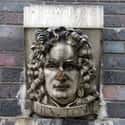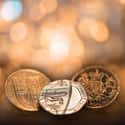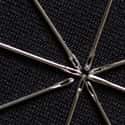-
(#10) Newton Plotted Against His Competitors
He feared criticism and was constantly paranoid that his colleagues were conspiring against him. As a result, Newton went after them vehemently.
Gottfried Wilhelm Leibnitz published his work on calculus in 1684, predating Newton's own work by twenty years; however, that didn't stop Newton from going after Leibnitz, accusing him of plagiarism. Newton went even further and openly campaigned against Leibnitz, who at the time was in the service of the Duke of Hanover. The Royal Society of London ultimately found Leibnitz guilt of plagiarizing Netwon's ideas, preventing Leibnitz from traveling with the Duke when he became King George I of England in 1714.
-
(#13) Isaac Newton Was Born Prematurely And Wasn't Expected To Survive
When Isaac Newton was born on Christmas Day, 1642 (or January 4, 1643, depending on which calendar is being used), he weighed only three pounds. In fact, he was born a full two to three months early and as a result had significant trouble breathing. Even though the doctor predicted that the newborn would not survive more than a few hours, Newton proved him wrong by living for 84 years. Newton's mother later said that when Isaac was born, he was so small that he could have fit into a quart mug.
-
(#12) Newton Persecuted Counterfeiters With A Vengeance
When Newton left Cambridge in 1696, he moved to London to serve as the Warden of the Royal Mint. By 1699, he had become Master of the Royal Mint, which was actually a lower rung on the bureaucratic ladder, but a better paid position. He held the position until his death in 1727.
As Master, Newton actively investigated and interviewed counterfeiters and informers, intent on punishing them to the greatest extent of the law, though he was opposed to the death penalty. Because counterfeiting was an act of treason, the punishment was death, and to Newton, the illegal manipulation of metal was probably an affront to his alchemist sensibilities as well. As Master, he likely supervised experiments with copper, gold, and silver.
-
(#6) Newton Hated His Stepfather And Was Basically Disowned
When Newton was three years old, his mother Hannah Ayscough remarried. Newton openly despised his mother's second husband, a preacher named Barnabas Smith - and by all accounts, the feeling was mutual. Hannah soon sent her son to live with his maternal grandmother, Margery, until Smith's death in 1653. Throughout his childhood, Newton's resentment toward Smith and his mother only continued to grow. Newton later recalled having wished his stepfather would die, and once even threatened to burn their house down.
Newton was basically treated like an orphan by his family. Smith made no mention of him in his will and when his maternal grandfather, James Ayscough, died, there was no mention of Newton in his will either. Once Smith died, Hannah returned to live with her mother, bringing with her three more children - two daughters and a son - and the extended family lived together until Newton went off to school.
-
(#4) Newton Confessed 48 Of His Greatest Sins
In addition to confessing that he had wished for the death of his stepfather, Newton listed 48 of his most offensive sins at the age of 19. He recounted numerous violations of working on Sundays and not honoring God, but also of lying, punching his sister, and having unclean thoughts.
He also wrote about conducting experiments on himself, most notably sticking a needle in his own eye while he researched optics. He also stared into the sun for extended lengths of time in order to experience changes to his vision.
-
(#2) Newton Was Accused Of Plagiarism And Almost Quit Science
Newton began publishing his research on light, color, and motion, with his first presentation being at the Royal Society of London in 1672. His ideas about light contradicted those of noted scientist and head of the Royal Society, Robert Hooke, earning Newton immediate criticism. Newton argued that light was made up of particles while Hooke believed it was a wave - and because Hooke had more academic clout at the time, a bitter rivalry developed. Hooke went so far as to convince fellow scientists that Newton was wrong.
Then, in 1675, Newton published another paper that drew even greater criticism; however, this time he was being accused of plagiarizing Hooke's ideas about the relationship between planets and the sun. Hooke, for his part, did have his own ideas about gravitation and the way that planets were attracted to the sun, but he never articulated a theory. The claims of plagiarism were unfounded, but it was still enough to drive Newton into a fit of rage in which he vowed to quit the Royal Society and never publish again.
New Random Displays Display All By Ranking
About This Tool
Sir Isaac Newton was the president of the Royal Society and a famous British physicist. He is the author of "Mathematical Principles of Natural Philosophy" and "Optics". In his paper "The Laws of Nature" published in 1687, he described the universal gravitation and the three laws of motion. These descriptions laid the scientific view of the physical world in the following three centuries and became the foundation of modern engineering.
Sir Isaac Newton is a scientific genius, he saved the country's economy and became the most influential physicist in history, but he also ruined his life and career and was addicted to sinful sex. The random tool tells 13 facts about the surprisingly miserable life of Sir Isaac Newton.
Our data comes from Ranker, If you want to participate in the ranking of items displayed on this page, please click here.
















